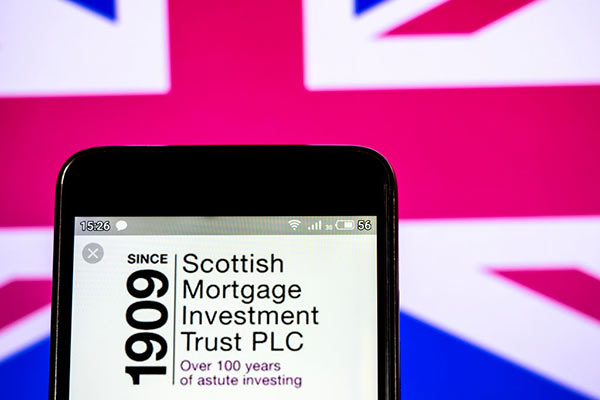Scottish Mortgage explains why it has reduced Nvidia
In an update today, the investment trust explains why it has taken some profits in the high-flying AI stock.
8th November 2024 10:14
by Kyle Caldwell from interactive investor

Scottish Mortgage (LSE:SMT), the global investment trust that focuses on disruptive growth businesses, has reduced its stake in the AI chipmaker Nvidia (NASDAQ:NVDA).
- Invest with ii: Buy Investment Trusts | Top UK Shares | What is a Managed ISA?
In its interim results, released this morning, the trust informed shareholders that artificial intelligence (AI) will be a key long-term theme. It said: “Understanding the implications of this technology wave will be our task for the next decade.”
However, it added that “despite growing conviction that generative AI will be a transformative general-purpose technology, we reduced our position in Nvidia, the leading designer of semiconductors for AI.” The trust first invested in Nvidia in 2016.
Concerns over the costs of companies implementing AI technology led to the reduction. The trust said: “The primary challenge hindering large-scale AI adoption remains the high cost. Companies must find ways to offer competitively priced AI systems, while managing the skyrocketing costs of training them. This raises concerns about the sustainability of current capital equipment spending, including Nvidia chips.”
Nvidia’s share price has soared since the start of 2023, increasing by 920% over that period. The market has moved to price in the future potential use of AI across various industries.
- Terry Smith: two reasons why I haven't bought Nvidia
- How to protect yourself against a major tech correction
- Is it time to come out of cash? And what to buy now
While Nvidia has been reduced, Scottish Mortgage's stake in Facebook-owner Meta Platforms (NASDAQ:META) has been increased.
The trust said: “Our investment in the AI ecosystem is not limited to Nvidia. We've increased our exposure to Meta Platforms, the parent company of Facebook, Instagram, and WhatsApp. AI will improve Meta's products and its business model provides many options for funding the necessary computing capacity.
“Its leadership team has a strong track record of successfully integrating technology innovations, giving us confidence in their strategy moving forward.”
The interim results revealed that, in the six months to 30 September 2024, Scottish Mortgage’s net asset value (NAV) per share increased by 1.9%, compared to a rise of 3.6% for the FTSE All-World Index. The share price returned -6.1% in the period.
Long-term returns paint a better picture. Over the past five years, to the end September 2024, Scottish Mortgage’s NAV and share price gained 88.9% and 70% respectively. This is ahead of the index’s 66.9% rise.
- Sign up to our free newsletter for investment ideas, latest news and award-winning analysis
- Beyond the ‘Magnificent’: five big growth themes to watch
- Fund managers explain what Trump victory means for US markets
Over the past decade, the NAV has grown by 347.8% and the share price by 281.4%, compared with 211.3% for the index.
The interim results say that during the six-month period £880.1 million had been spent on share buybacks in an attempt to keep a lid on the trust's discount.
In March, Scottish Mortgage said that it would make available at least £1 billion for the purpose of purchasing its own shares over the following two years. In today’s statement, shareholders were told “the board and managers remain committed to the continuation of the buyback”.
Scottish Mortgage is currently trading on a discount of -9.6%.
These articles are provided for information purposes only. Occasionally, an opinion about whether to buy or sell a specific investment may be provided by third parties. The content is not intended to be a personal recommendation to buy or sell any financial instrument or product, or to adopt any investment strategy as it is not provided based on an assessment of your investing knowledge and experience, your financial situation or your investment objectives. The value of your investments, and the income derived from them, may go down as well as up. You may not get back all the money that you invest. The investments referred to in this article may not be suitable for all investors, and if in doubt, an investor should seek advice from a qualified investment adviser.
Full performance can be found on the company or index summary page on the interactive investor website. Simply click on the company's or index name highlighted in the article.